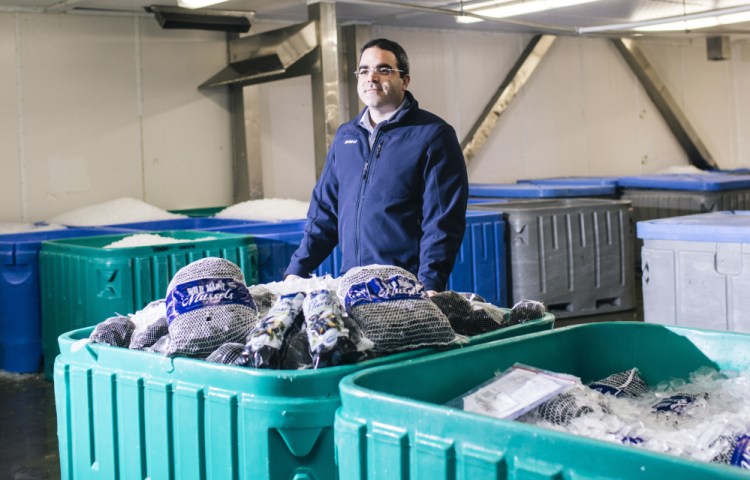Peter Handy says he’s been “inching his way toward Maine” since his birth in California, college in Philadelphia and work on Wall Street. He has finally arrived, promoted last week from vice president of business development to president and chief executive officer of Bristol Seafood. The 24-year-old company, located on the Portland Fish Pier, has 85 employees and about $40 million in annual sales of haddock, cod, mussels and scallops.
While at the University of Pennsylvania, Handy started “Box My Dorm,” his first foray into entrepreneurship. The service allowed students to box up their belongings for the summer and have them delivered back to their new dorm for the fall semester.
Q: Did your startup, “Box My Dorm,” prepare you to run a seafood company?
A: Exactly! A lot of it is similar. Customer service is paramount, so for that, there are a lot of similarities. The students had different needs than the moving companies, and fishermen often have different needs and concerns than what the end users have. There are stories to tell.
Q: Such as?
A: I think we do a good job of taking a high-quality product from the boat to the plate, but we want to make sure the story stays with it. We want the consumer to know how it was caught, where it was caught and who caught it. The more you know about fish, the better it tastes.
Q: How do you do that?
A: Most recently, we launched a product of wild Maine mussels. Most people don’t know wild Maine mussels exist, so we took a video crew out and put a drone in the air and interviewed the fisherman about why he harvests Maine mussels. Then (we filmed) what we do in our facility and then how we put it in front of chefs. And then we can share the chain with the fisherman, too, so he can see how the product is fitting in the market.
Q: What do your stories focus on?
A: With seafood, there’s a lot of subtlety. Like haddock is caught in a lot of different places, and we know that in Maine a lot of people are focused on products that are fresh and consistent and sustainable. So we look at things like fish that’s line-caught, frozen at sea and that produces a fish that’s fresher. It’s an all-natural product that’s getting handled and hand-cut here in Maine.
We like to say we’re a company that makes food for people who like to eat. We’re meticulous about getting the food right. We’re about 85 people on the fish pier in Portland, open seven days a week, with three (product) lines – fish, scallops and wild Maine mussels. The commonality on all three is the focus on quality and food safety. Every piece is hand-finished and hand-packed to meet our standards.
Q: You’re a major customer for Eimskip, the Icelandic shipping company that has a major operation in Portland. Do you ship your fish via Eimskip, or is it the other way around?
A: We receive a lot of our haddock, which we get from Norway, from Eimskip. If you look at flying freight that’s fresh, versus over the water that’s frozen, the benefit is environmental. There’s 90 percent less of a carbon footprint (going by sea). And we’ve eliminated Styrofoam over the last few years. We not only give our customer a high-quality product, but we’re also responsible for the product and the fisheries.
Q: So where does your seafood go?
A: We ship from Honolulu to Augusta.
Q: Where do you see Bristol’s growth coming from?
A: Giving our customers what they want. We did record sales last year and people are happy about what they’re eating. There’s a significant opportunity for people to eat more fish in the United States. There hasn’t been significant growth in seafood consumption for a number of years. One of the reasons that we’re excited about wild Maine mussels is that they’re affordable, and they’re super easy to cook. If they’re open, they’re done, if they’re not, they’re not. And who doesn’t have some wine and butter around?
Q: So you think mussels will provide a lot of your growth?
A: Absolutely. We’ve seen our mussel (sales) volume quadruple in the last four months.
Q. But there’s concern about the wild mussel populations in Maine. Is that a sustainable fishery?
A. In southern Maine, people are seeing fewer mussels. What we are experiencing where we get our mussels (near Acadia National Park) is different. We get our mussels in deeper water, about 30 feet deep, rather than in the tidal areas. Also, all the smaller mussels go back into the sea. We’re founding members of the Gulf of Maine Research Institute sustainability program and we want to make sure, as we build the market for mussels, that it remains sustainable.
Q: What’s your strategy going forward?
A: When you share the story of the seafood, it’s something people can enjoy on a deeper level. So it will become a bigger part of our business. Our scallop business is growing as well. We give people a great experience. So many folks have said that it’s like when they had a carrot for the first time at a farmers market. They go, “So that’s what it’s supposed to taste like. Wow!” To have that reaction is what we work for.
Send questions/comments to the editors.



